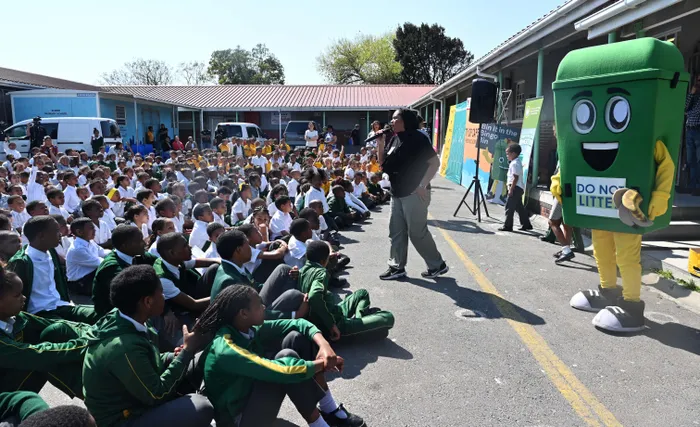
As part of the recycling project, participating schools will be provided with storage facilities, as well as sorting and waste-handling equipment to manage recyclable materials effectively.
Image: City of Cape Town
The City of Cape Town, in collaboration with the Western Cape Government (WCG) and Polyco, has unveiled Waste Warriors 2, an innovative initiative designed to revolutionise waste management by empowering schools to establish community recycling collection and sorting hubs. Building on previous successful projects, this enhanced effort aims to strengthen the recycling value chain in Cape Town and promote the circular economy.
“We are incredibly excited about the potential of this project,” said Michelle Joja-Johannes, the City’s Acting Director for Public Empowerment and Development.
“Schools can be key partners in shifting mindsets around waste and building a culture of recycling in our communities.” This initiative, grounded in a cost-sharing model between the City and WCG, will initially implement recycling collection points at 10 strategically selected schools across the metro.
Each participating school will receive essential resources, including storage facilities and sorting equipment, to effectively manage recyclable materials. Furthermore, the initiative will create 20 employment opportunities for Expanded Public Works Programme (EPWP) beneficiaries, who will play a vital role in ensuring materials are sorted and prepared for sale to local recycling enterprises. This not only provides dignified employment but also offers beneficiaries the chance to gain valuable skills and experience in the growing waste management sector.
The benefits of the Waste Warriors 2 initiative extend far beyond employment. Schools involved will have the opportunity to divert recyclables, enabling them to generate revenue while simultaneously fostering a practical platform for environmental education among learners. This exposure will promote sustainable practices, contributing to cleaner school environments. The initiative also aims to engage surrounding communities, encouraging their active participation in reducing litter through recycling.
Central to the project’s design is a commitment to knowledge sharing between the City and WCG. Officials have leveraged lessons learned from past projects to refine their approach, aiming to enhance community involvement and the management of school-based recycling drop-offs. The project also looks to facilitate collaborations between local waste pickers, small recycling businesses, and the schools, ensuring that relationships forged contribute to the sustainability of local recycling systems.
This reflective approach not only enhances the initiative's efficacy but also lays the groundwork for long-term economic sustainability. “I encourage all communities around participating schools and businesses to please get involved and support your local schools by dropping their recyclables at the hub,” Joja-Johannes emphasised.
As Waste Warriors 2 rolls out, it represents a significant step towards nurturing a future where recycling becomes second nature among the younger generation, inspiring a collective commitment to a cleaner, healthier environment.
Related Topics: